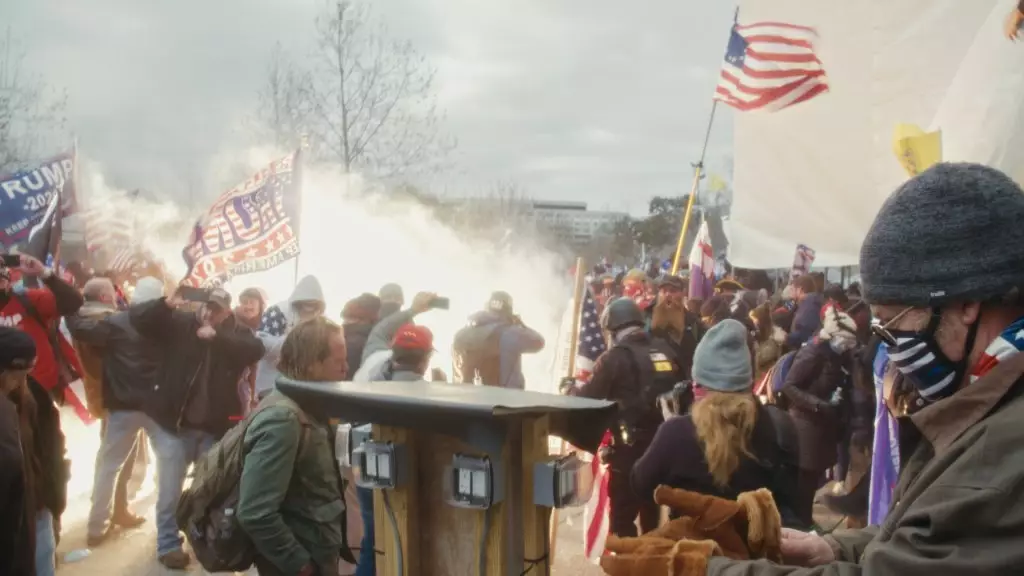In the annals of American history, few events have elicited as much fervor and division as the January 6 riot at the United States Capitol. The tumultuous day, marked by chaos and confrontation, continues to resonate deeply across political and social spheres. “Fight Like Hell,” a new feature documentary directed by Jon Long, strives to unravel this complex narrative by offering an unprecedented view into the events leading up to that fateful day. Premiering on YouTube, this film endeavors to document the maturation of the “Stop the Steal” movement, which gained momentum amidst widespread allegations of electoral fraud following the 2020 Presidential election.
Unlike many critiques and narratives that often lean towards partisan viewpoints, “Fight Like Hell” claims to provide an immersive experience devoid of bias. By employing high-quality RED camera technology, the documentary offers viewers not just a retelling, but a visceral feel for the tension and emotions that led to the unprecedented breach of the Capitol. The film’s synopsis suggests that it presents the progression of the “Stop the Steal” movement with an open lens, capturing events from the inception of the controversy long before Election Day.
This thoughtful approach aims to strip away the layers of subjective interpretation and soundbites that often saturate discussions surrounding January 6. By allowing viewers to witness firsthand accounts and experiences, Long and his team endeavor to foster understanding rather than division.
The documentary spotlights prominent figures deeply involved in the events surrounding the capitol riot, including Roger Stone, Steve Bannon, Rudy Giuliani, and Ret. Lt. Gen. Michael Flynn. Each of these individuals played a pivotal role in shaping the narrative of the “Stop the Steal” movement. Stone, often viewed as a strategist for Trump, has been a controversial figure with a significant history having deep ties to political maneuvering. Bannon, whose relationships and influence extend throughout the Republican Party, is further illuminated as a key advisor whose actions stirred the pot of division. Giuliani, formerly known for his leadership in New York City, adds another layer as a legal figure attempting to overturn established election results.
Through careful narration, the documentary not only highlights their actions but also their motivations—providing a rich tableau of the human aspects behind the politics. Long’s director’s statement underscores the complexities of public perception regarding these figures, acknowledging that the muddied waters of information have led to a skewed understanding of their roles leading up to January 6.
“Fight Like Hell” embodies a critical perspective in today’s media landscape, where partisan narratives frequently dominate the discourse. By presenting an independent documentary, Long and his team attempt to carve out a space for impartial investigation. Viewers are encouraged to engage critically with the material, reflecting on both the events and their implications for American democracy. When faced with such a polarizing topic, the challenge remains: how to comprehend an event that has become so deeply embedded in the “us vs. them” narrative that has taken hold in contemporary society?
The film’s focus on the fragility of democracy serves as a vital reminder of the responsibilities citizens bear to nurture and protect their democratic processes. In an era of deepening rifts, it calls for introspection and encourages a dialogue that transcends political loyalties. The overarching message is not merely about recounting events, but rather about understanding the broader implications for future governance and societal cohesion.
As anticipation builds toward the premiere of “Fight Like Hell,” audiences are encouraged to prepare for a journey that explores one of the most significant political events in modern American history. Long’s commitment to presenting a factual and nuanced portrayal invites viewers to re-examine their perspectives on democracy, civic responsibility, and the narratives that drive division. Ultimately, “Fight Like Hell” is not just a film; it’s a call to look beyond the noise and dissect what truly matters for the future of the nation.

Leave a Reply